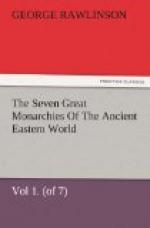We are told that Nimrod was “a mighty hunter before the Lord;” and it is evident, from the account already given of the animals indigenous in Lower Mesopotainia, that there was abundant room for the display of a sportsman’s skill and daring when men first settled in that region. The Senkareh tablets show the boldness and voracity of the Chaldaean lion, which not only levied contributions on the settlers’ cattle, but occasionally ventured to attack man himself. We have not as yet any hunting scenes belonging to these early times; but there can be little doubt that the bow was the chief weapon used against the king of beasts, whose assailants commonly prefer remaining at a respectful distance from him. The wild-boar may have been hunted in the same way, or he may have been attacked with a spear—a weapon equally well known with the bow to the early settlers. Fish were certainly taken with the hook; for fish-hooks have been found in the tombs; but probably they were also captured in nets, which are among the earliest of human inventions.
A considerable portion of the primitive population must have been engaged in maritime pursuits. In the earliest inscriptions we find constant mention of the “ships of Ur,” which appear to have traded with Ethiopia —a country whence may have been derived the gold, which—as has been already shown—was so largely used by the Chaldaeans in ornamentation. It would be interesting could we regard it as proved that they traded also with the Indian peninsula; but the “rough logs of wood, apparently teak,” which Mr. Taylor discovered in the great temple at Mugheir, belong more probably to the time of its repair by Nabonidus than to that of its original construction by a Chaldaean monarch. The Sea-God was one of the chief objects of veneration at Ur and elsewhere; and Berosus appears to have preserved an authentic tradition, where he makes the primitive people of the country derive their arts and civilization from “the Red Sea.” Even if their commercial dealings did not bring them into contact with any more advanced people, they must have increased the intelligence, as well as the material resources, of those employed in them, and so have advanced their civilization.
Such are the few conclusions concerning the manners of the Chaldaeans which alone we seem to have any right to form with our present means of information.
CHAPTER VII.
RELIGION.
The religion of the Chaldaeans, from the very earliest times to which the monuments carry us back, was, in its outward aspect, a polytheism of a very elaborate character. It is quite possible that there may have been esoteric explanations, known to the priests and the more learned, which, resolving the personages of the Pantheon into the powers of nature, reconciled the apparent multiplicity of gods with monotheism, or even with atheism. So far, however, as outward




